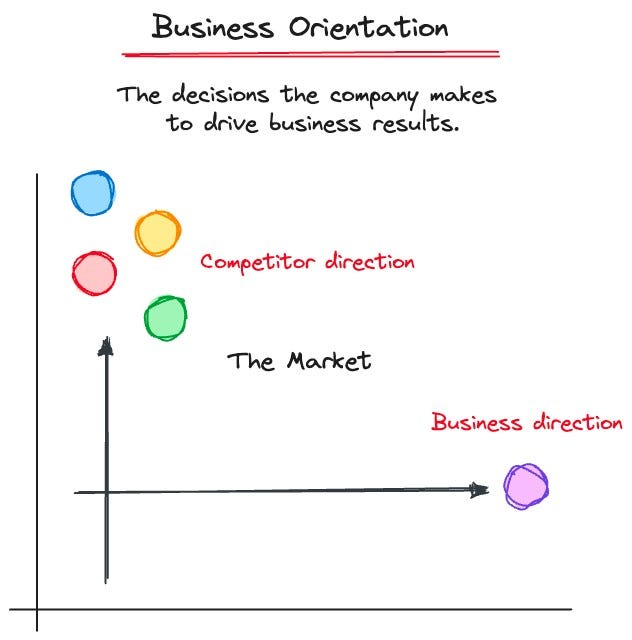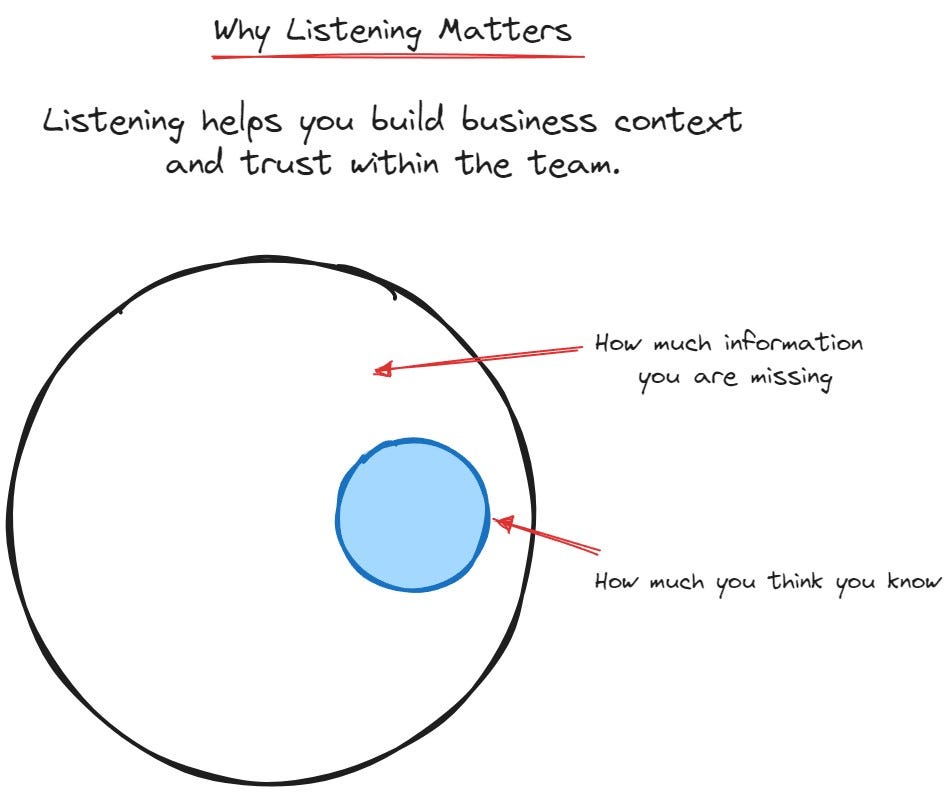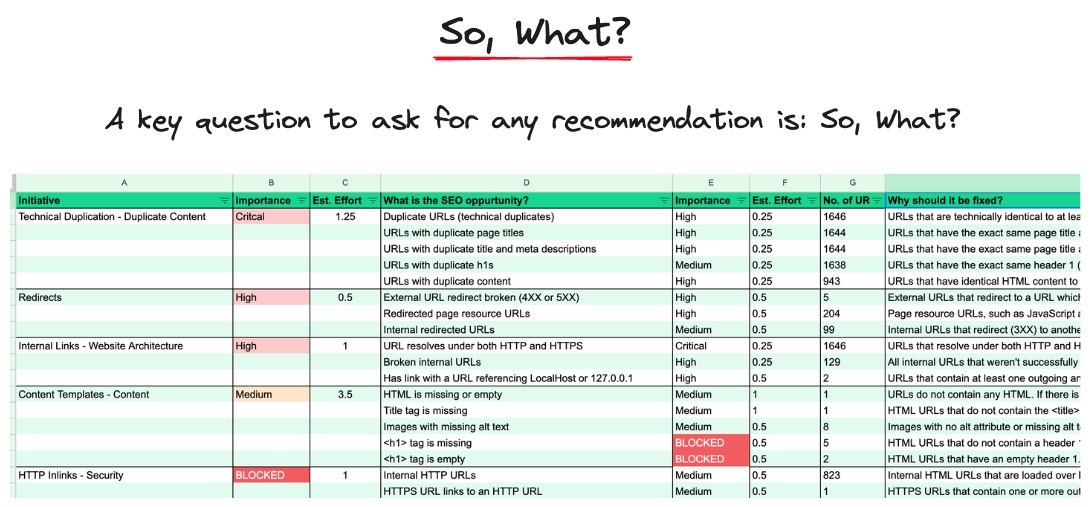Hello 👋,
Welcome to the Monday morning ideas newsletter ☕️.
Every Monday morning, receive 3 ideas on how to work more effectively in product and dev teams.
To receive articles like this, please subscribe to The SEO Sprint 👇.
I’m still running The SEO Sprint subscriber survey. Fill in a 2-minute survey so I can customize the content to your needs.
[Sponsor]
Are you a B2B SaaS company looking to get more traffic and increase your online presence?
Dofollow.com is a premium link-building agency that can get your business ranked higher in search engines (like Google).
Get in front of more customers by having quality and relevant websites link to your business.
You can turn your website into a traffic & lead gen machine with links from major sites like HubSpot, BigCommerce, Canva, Envato, Business Insider & 100s more.
Get traffic-boosting, high-quality backlinks to your business with dofollow.com.
1) Business Orientation
Buy-in from business stakeholders is a hot topic in SEO.
But where do you start?
I’d recommend starting by identifying the direction the company wants to take to become successful. This is called business orientation.
What is it?
Business orientation is the strategic decisions a company makes to win and drive sales.
For example:
A company might decide to launch a brand-new product.
A company might decide to move to a new CMS and rebrand.
A company might decide to invest in a new brand and product.
A company might decide to expand into the international markets.
A company wants to improve the mobile experience for customers.
The leadership, C-suit or management teams usually make these decisions. It’s these decisions which trickle down and shape the roadmaps/workflows of other teams.
Why does this have to get SEO projects executed?
Let me explain what I mean by telling a story.
I was at DeepCrawl. The CEO was explaining the direction of the business (aka the decision they had made). Everyone was crowded into a room. He was explaining the business direction in a slide deck. And then showed us a slide I will never forget.
“Everyone is trying to be an SEO suite. They are going in this direction. But we’re specialising in technical SEO and want to go in this direction.” he said.
From that moment the product, marketing and sales teams were focused on executing that vision for the company. Anything not helping achieve that vision was deprioritised.
Working in-house showed me that decisions in the business are always being made.
And these decisions will impact your ability to get anything done with the product and development team.
So, how can you use business orientation to get your SEO projects executed?
When working with or within companies, you need to be on the lookout for those big decisions the company has made in an effort to drive sales.
It comes down to listening and keeping alert.
A GREAT place to see these decisions hidden in plain sight:
📈 Quarterly reports - Company quarterly reports highlight the strategic priorities and decisions for shareholders (e.g. *Atlassian, SEMrush, SimilarWeb*).
🗣️ Company updates - Most companies have a company update where each team reports on their progress and results.
👥 Team roadmaps - Many teams should have a slide deck or list of strategic priorities they are working on to achieve a set of goals.
However, I’ve found that these decisions aren’t written down. They are stored in people's heads. You need to talk to the senior team and ask what the strategic priorities are for the company.
Once you’ve identified these strategic priorities and decisions, you then need to:
🏗️ Position your recommendations that can fit into these decisions.
🚦 Prioritise your recommendations to lend support to these decisions.
It’s why many SEOs working in product and engineering teams focus on supporting the roadmap of those teams (check out Areej AbuAli podcast).
Anything else won’t be a priority unless you’ve got a VERY compelling reason.
I’d recommend reading Tom Critchlow’s SEO MBA 👇 which goes deep on business orientation and making SEO strategically important.
2) Listening Matters
Listening is one of the most important skills you can have when working in any team.
Especially when you are working with product and development teams.
As a Product Manager at DeepCrawl, I realised that one of my most important meetings was the weekly or monthly catch-up with senior team members.
In these meetings, I learned to shut up and listen to what was happening to other team members. For example:
🔊 Why marketing was working on certain initiatives.
📞 The initiative of the customer success teams is to support customers.
📈 Why sales teams were having a hard time driving results for the business.
Each meeting allowed me to understand the strategic priorities within the business. It allowed me to build trust by speaking to senior members of the team.
Why does listening help get SEO projects executed?
How well you listen can have a major impact on:
📈 Your effectiveness in working with tech teams, and
🤝 The quality of your relationships with these teams.
For example, listening can help you:
💡 Gain information - This allows you to identify upcoming projects or problems where SEO can support the team (building trust with those team members).
🧠 Understand - Better understand the context behind decisions or problems.
🎓 Learn - Learn more about a particular process or tech stack.
While in catch-up meetings and listening to senior developers, sales and customer support, I learned much about the business from different perspectives.
I call this discovery, and listening to different team members allowed me to gain further context around problems within the business. I could use this information to:
🚦 Prioritise initiatives ruthlessly
🛍️ Get buy-in for initiatives or projects
🦒 Identify new potential opportunities
Honestly, one of the best ways to improve your listening skills is just to:
Book a 1:1 meeting with senior members of the team.
Ask them questions like:
What are they working on?
Why?
I’ve used this technique many times to better understand and gain context around development, business and product teams.
3) So, What?
The most important question to ask when reviewing work is: So, what?
A BIG problem I noticed when working in-house was the constant stream of requests from business teams. The problem was that a lot of stakeholders wanted their requests to be implemented.
However, when digging into the request. And asked me So, What? it quickly became clear that these requests were only a small priority. In fact, working on these requests would actually take away from the strategically important work.
This happened all the time.
Product and engineering teams are constantly on the defensive. Critically review requests from other teams to make sure any new work is actually worth the team’s time.
As SEOs, we need to keep asking ourselves So, What? when we are sending recommendations and requests to tech teams. Especially when we send across prioritised SEO action lists with no context.
So, how can SEOs use this to get SEO projects executed?
Before you send any request to a product or development team. Just ask yourself a simple question: So, What?
Don’t just send a recommendation.
Always make it clear WHY a request or recommendation is important to work on. And actually make it clear to the product and engineering team.
The more you spell out why a problem is worth solving, the easier you’ll make their jobs. The easier you are to work with, the greater the chance they’ll prioritise a request from you in the future.
All because you stopped and asked a simple question.
How did I do this week?
If you enjoyed reading this article, then consider the following:
📰 Share — Please share the newsletter with your network or colleagues if you think they might find it helpful!
✉️ Subscribe to The SEO Sprint newsletter — if you haven’t already, please consider subscribing.







